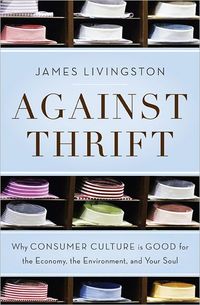

Purchase
Why Consumer Culture is Good for the Economy, the Environment, and Your Soul
Basic Books
December 2011
On Sale: November 22, 2011
290 pages
ISBN: 0465021867
EAN: 9780465021864
Kindle: B005OVTL3M
Hardcover / e-Book
Add to Wish List
Non-Fiction
Since the financial meltdown of 2008, economists, journalists, and politicians have uniformly insisted that to restore the American Dream and renew economic growth, we need to save more and spend less. In his provocative new book, historian James Livingston—author of the classic Origins of the Federal Reserve System—breaks from the consensus to argue that underconsumption caused the current crisis and will prolong it. By viewing the Great Recession through the prism of the Great Depression, Livingston proves that private investment is not the engine of growth we assume it to be. Tax cuts for business are therefore a recipe for disaster. If our goal is to reproduce the economic growth of the postwar era, we need a redistribution of income that reduces corporate profits, raises wages, and promotes consumer spending.
Comments
No comments posted.
Registered users may leave comments.
Log in or register now!
| 


 © 2003-2025 off-the-edge.net
all rights reserved Privacy Policy
© 2003-2025 off-the-edge.net
all rights reserved Privacy Policy